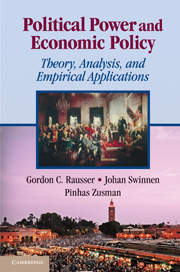Book contents
- Frontmatter
- Contents
- List of Figures
- List of Tables
- Preface
- PART 1 POLITICAL POWER AND ECONOMIC ANALYSIS
- PART 2 IDEOLOGY, PRESCRIPTION, AND POLITICAL POWER COEFFICIENTS
- PART 3 ANALYSIS OF SPECIFIC STRUCTURES
- 10 The Political Economy of Commodity Market Intervention
- 11 The Political Economy of Public Research and Development
- 12 Political-Economic Analysis of Redistributive Policies and Public Good Investments
- 13 Interest Groups, Coalition Breaking, and Productive Policies
- 14 Policy Reform and Compensation
- 15 Political-Economic Analysis of Land Reform
- 16 Political-Economic Analysis of Water Resource Systems
- 17 The Political Economy Lens on Quality and Public Standard Regulations
- 18 Political-Economic Analysis in Transition Economies
- 19 The Power of Bureaucracies: The European Commission and EU Policy Reforms
- PART 4 EMPIRICAL APPLICATIONS OF POLITICAL POWER ESTIMATION
- References
- Index
19 - The Power of Bureaucracies: The European Commission and EU Policy Reforms
Published online by Cambridge University Press: 05 June 2012
- Frontmatter
- Contents
- List of Figures
- List of Tables
- Preface
- PART 1 POLITICAL POWER AND ECONOMIC ANALYSIS
- PART 2 IDEOLOGY, PRESCRIPTION, AND POLITICAL POWER COEFFICIENTS
- PART 3 ANALYSIS OF SPECIFIC STRUCTURES
- 10 The Political Economy of Commodity Market Intervention
- 11 The Political Economy of Public Research and Development
- 12 Political-Economic Analysis of Redistributive Policies and Public Good Investments
- 13 Interest Groups, Coalition Breaking, and Productive Policies
- 14 Policy Reform and Compensation
- 15 Political-Economic Analysis of Land Reform
- 16 Political-Economic Analysis of Water Resource Systems
- 17 The Political Economy Lens on Quality and Public Standard Regulations
- 18 Political-Economic Analysis in Transition Economies
- 19 The Power of Bureaucracies: The European Commission and EU Policy Reforms
- PART 4 EMPIRICAL APPLICATIONS OF POLITICAL POWER ESTIMATION
- References
- Index
Summary
Introduction
In this chapter we analyze the relationship between the policy-making process and the underlying constitutional structure. The constitutional structure is specified in terms of the rules of agenda setting and decision making and how this affects the distribution of power. The conceptual formulation in this chapter is motivated by the policy-making process of the European Union (EU) and the role played by the bureaucracy, in this case the European Commission, in the agenda-setting process. A structural model is presented linking the underlying rules for agenda setting and policy making to the actual distribution of political power.
In earlier political economy models linking the distribution of political power to alternative governance, the focus is on the direct or reduced-form link between constitutions and policies. In recent years, advancements in political economy increasingly focus on the distribution of political power, the role of governance structures, coalition formation, and the mechanism design issues that are faced in the implementation of public policies. These studies draw importantly on the political science literature, most notably on the insights of Baron and Ferejohn (1989), who extended the Rubenstein (1982) alternating bargaining game. An important source of political power in their model is the agent who is assigned the role of proposer or controller of the agenda. This approach has been integrated in important contributions by Persson, Roland, and Tabellini (2000) on the micro-foundations for public finance in political regimes where the standard self-interest motivation is presumed for all agents or political actors.
- Type
- Chapter
- Information
- Political Power and Economic PolicyTheory, Analysis, and Empirical Applications, pp. 380 - 390Publisher: Cambridge University PressPrint publication year: 2011



